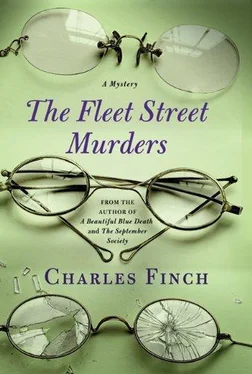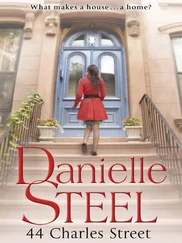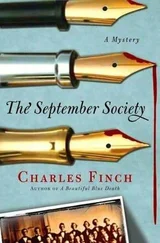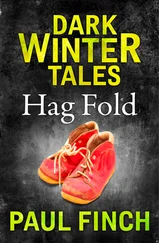Charles Finch - Fleet Street murders
Здесь есть возможность читать онлайн «Charles Finch - Fleet Street murders» весь текст электронной книги совершенно бесплатно (целиком полную версию без сокращений). В некоторых случаях можно слушать аудио, скачать через торрент в формате fb2 и присутствует краткое содержание. Жанр: Исторический детектив, на английском языке. Описание произведения, (предисловие) а так же отзывы посетителей доступны на портале библиотеки ЛибКат.
- Название:Fleet Street murders
- Автор:
- Жанр:
- Год:неизвестен
- ISBN:нет данных
- Рейтинг книги:5 / 5. Голосов: 1
-
Избранное:Добавить в избранное
- Отзывы:
-
Ваша оценка:
- 100
- 1
- 2
- 3
- 4
- 5
Fleet Street murders: краткое содержание, описание и аннотация
Предлагаем к чтению аннотацию, описание, краткое содержание или предисловие (зависит от того, что написал сам автор книги «Fleet Street murders»). Если вы не нашли необходимую информацию о книге — напишите в комментариях, мы постараемся отыскать её.
Fleet Street murders — читать онлайн бесплатно полную книгу (весь текст) целиком
Ниже представлен текст книги, разбитый по страницам. Система сохранения места последней прочитанной страницы, позволяет с удобством читать онлайн бесплатно книгу «Fleet Street murders», без необходимости каждый раз заново искать на чём Вы остановились. Поставьте закладку, и сможете в любой момент перейти на страницу, на которой закончили чтение.
Интервал:
Закладка:
He recalled something his father had once said. Lenox had been four, perhaps five, and his father had been preparing to go into London for the start of the new session. Edmund, two years older and preoccupied with his schoolmates, had given his father a handshake and run off with a cricket bat. To Charles, though, it was a sorrowful occasion.
His father wore a pristine dark suit, and with a stroke of inspiration the young Lenox ran upstairs and found the old, tatty corduroy jacket, patched at the elbows and threadbare in the shoulders, that his father wore around the stables and out on his land. He handed it to his father wordlessly, and when the man realized Charles’s purpose, a look of kindness came onto his often austere face.
“Oh, little one,” he said. “Don’t be sad.” He kneeled down and took Charles’s hands and looked him in the eye. “Remember,” he went on, “that once a man’s name is entered into the book of Members, nobody can ever take that achievement away from him. It is the highest honor one can receive, to enter Parliament. It may be a little sad for you and-I’ll tell you a secret-for me, but it is for the thousands of men and boys we don’t know that I must go, and serve my country.”
It seemed like an endless day, but slowly it began to fetch toward evening. Lenox spoke again at three and realized with a start that there were now hundreds of people around the hustings. By four o’clock all three carriages were running at full speed, bringing in thirty more people every thirty minutes, and when at four thirty Crook informed him that there were still far too many people willing to vote who might not make it into Stirrington, Lenox ordered a fourth carriage.
At five something novel happened, just when things had gotten a little bit sluggish: Roodle came to the Queen’s Arms.
He had been expecting to find Lenox onstage, perhaps, and looked a little nonplussed when he found instead a grain merchant talking in a heavy northern accent of crop yields, but he went on with his plan anyway.
“Ask Mr. Lenox if he can take you to St. Mary’s churchyard, where half of our ancestors are buried!” he said.
Boos.
“Ask Mr. Lenox if he can direct you to the Martyrs’ Memorial-and not the one in Oxford!”
More boos, and then someone shouted, “Ask Mr. Lenox if beer is too expensive!” which drew tremendous cheers and drowned out whatever Roodle, who looked furious, was going to say next. When the crowd finally quieted he said, “Only a member of our town’s community should be our town’s Member!”
The clever little smirk he gave while he said this line infuriated Lenox’s supporters, and they drove him and the small cordon of Roodleites with him down the street, catcalling them as they left, until they were gone.
At seven o’clock Lenox, hoarse and exhausted, mounted the hustings one last time. A harried cheer went up, but people had become a little weary-not of the man but of the day and its excitement.
“Ladies and gentlemen, whether I win or lose this by-election, today has been one of the most wonderful days of my life,” he said. “Whether I win or lose, nothing I have done these past few weeks will be in vain, because I have discovered the best small town in England!”
He paused for another cheer. “Thank you, thank you. Now I have one last favor to ask you. At eight o’clock the polls close, and I see many faces that were here at eight this morning. You all deserve to go home, but on your way please stop just one person and ask him if he’s voted. Then, if he says no, tell him why you believe that Charles Lenox is the best man to serve Stirrington-and why Robert Roodle isn’t, for that matter.”
Another cheer. “Thank you!” he said. “I feel honored by your support.”
He came down from the stage but this time to the front, rather than escaping to the back and the pub, and allowed the people to engulf him. He shook hands until his forearm was sore and commiserated with the many people he had met. By eight only a dozen or so supporters remained, the rest spread out across the city, on their way home.
He went back into the Queen’s Arms, where Crook gave him a broad smile and put a paternal arm around his shoulder. “You did awfully well, Mr. Lenox,” he said. “Really better than I expected.”
“Call me Charles,” said the candidate, who suddenly realized that he was not only falling-down tired but famished. “I say, is there any food to be had?”
“Of course, of course.”
Ten minutes later, sitting at a table in a private room at the back of the building with Crook, Lenox fell upon a plate of battered cod and red potatoes. A new, more jovial side of Crook appeared as the two men sat and talked. He fetched a bottle of Bordeaux and regaled Lenox with stories of Stirrington’s more eccentric history: Mr. Weathers, who went out to the middle of his fields every day and cast a fishing pole in the middle of his crops, then sat and dirt-fished all day; the mayor before Adlington, who had been fond of a rainbow-colored waistcoat that very nearly caused a revolt among his subordinates. It was as if he had finally shepherded Lenox through the campaign and could relax.
Then at ten o’clock, very suddenly-for Lenox was lulled into a gentle stupor by the wine, Crook’s voice, the food, and the fire-it was time to see who had won the election. Sandy Smith stood in front of the pub and nodded gravely when they came out, and the three men walked over. At City Hall there was an agonizing half hour while the last few votes were counted and Mayor Adlington was roused from a nap to read the results. Just before they were ready, Roodle came storming in. Then, in a surreal tableau that Lenox felt more observer of than participant in, they went into a small room and heard the results.
It was over. He had lost.
CHAPTER THIRTY-TWO
It was a bitter, bitter thing to swallow. In the end only two hundred votes had separated the men. Pushing his pride to the side, Lenox reached out his hand to Roodle, but the brewer pushed past him with a sneer and went outside to announce the news to his waiting supporters. Lenox knew he had to do the same, though he scarcely felt equal to the task.
He was glad there were books in the world, at that moment; glad that there were maps and encyclopedias, and warm fires and comfortable armchairs. He wanted to retreat into his library for a year without leaving it and eat good lunches and take long naps. But he told himself that a Lenox of Lenox Hall ought to have more mettle than to wish for something like that, and he went outside and delivered a brief, grateful encomium to his supporters before going back to the Queen’s Arms.
“It should never have been so close,” was all Crook said. “Roodle thought he’d win by a landslide. We did our side proud.”
“I can’t help but think of that single day I wasn’t here. Mightn’t I have met another two hundred people that day and perhaps impressed upon half of them my suit? Mightn’t I have won a hundred of them and drawn even with Roodle?”
Rather surprisingly, Crook said with a severe glance, “That’s no way to think at all-Charles. You did your level best. No other candidate short of Peel reincarnated could have done more or worked harder.”
They arrived back at the Queen’s Arms, and in his weariness Lenox wrote two brief telegrams with the same message (“I lost. It’s all right.”) to Edmund and to Lady Jane. Then he took himself upstairs, had a few solitary moments of self-recrimination and sorrow, and fell into bed, exhausted.
When he woke in the morning it was to see Graham seated at the table by the window, a tray with coffee and sweet rolls before him.
“Is there something wrong, Graham?”
“Good morning, sir. I merely wished to see if you required anything.”
Читать дальшеИнтервал:
Закладка:
Похожие книги на «Fleet Street murders»
Представляем Вашему вниманию похожие книги на «Fleet Street murders» списком для выбора. Мы отобрали схожую по названию и смыслу литературу в надежде предоставить читателям больше вариантов отыскать новые, интересные, ещё непрочитанные произведения.
Обсуждение, отзывы о книге «Fleet Street murders» и просто собственные мнения читателей. Оставьте ваши комментарии, напишите, что Вы думаете о произведении, его смысле или главных героях. Укажите что конкретно понравилось, а что нет, и почему Вы так считаете.












